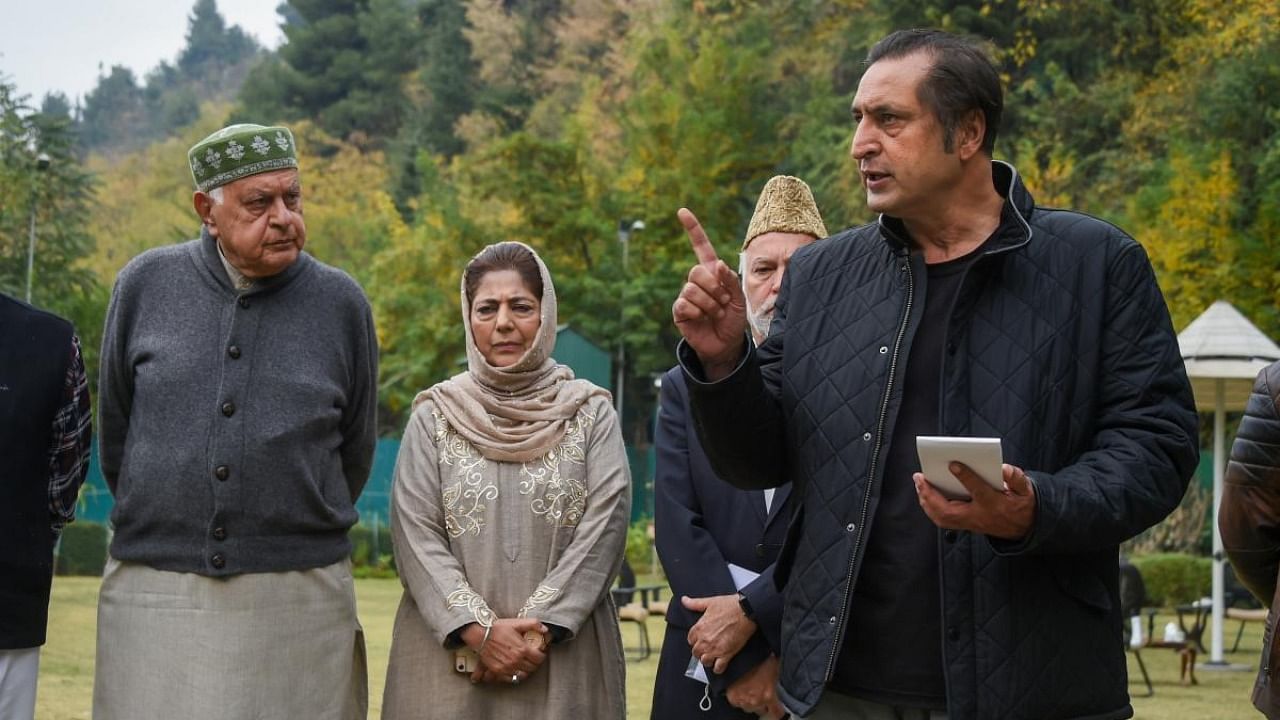
The People’s Alliance for Gupkar Declaration (PAGD), a coalition of various political parties in Kashmir, has surprisingly remained silent on the political issues in the Union Territory (UT) for the last three months. The PAGD was formed in October 2020 by Kashmir-centric political parties with a pledge of perseverance and steadfastness towards the restoration of special status to Jammu and Kashmir, which was revoked by the Centre in August 2019.
The resolution was part of the alliance’s declaration, wherein the parties stated that there would be “nothing about us without us,” meaning they will stick together come what may. From day one, the people of J&K knew it was another experiment of “convenience” and didn’t expect much from the alliance. However, nobody had expected the meltdown of the alliance so soon.
Just two weeks after the alliance came into existence, its two main constituents — National Conference (NC) and People’s Democratic Party (PDP) — fielded proxy candidates against each other in several seats during the District Development Council (DDC) polls held last December. After the results, both have been taking divergent stands on important political issues confronting J&K. There has been no formal or informal meeting of the alliance leaders since the DDC poll results were declared on December 22.
Also read: Explained | What is Gupkar Alliance?
Even the NC leaders, including its president Farooq Abdullah and his son Omar, have opted to maintain a pin-drop silence over PDP president Mehbooba Mufti’s questioning by the Enforcement Directorate (ED) in an alleged money laundering case.
When the same probe agency grilled senior Abdullah a few months ago in connection with another such case, Mehbooba had termed it a political vendetta. When junior Abdullah was asked by reporters to comment on Mehbooba’s grilling by the ED, he was evasive. “From J&K to Tamil Nadu, Assam to Gujarat, neither is Mehbooba the first leader (to be summoned by the ED) nor will she be the last,” he said.
As of now, a significant opinion in the NC and PDP has grown increasingly sceptical about their alliance and for very different reasons. While the NC thinks the PAGD is proving detrimental to its traditional standing as the largest J&K party, the PDP feels the NC is going slow on the demand for restoration of the erstwhile state’s special status as the Centre turns up heat.
In between, an important constituent of the PAGD — the People’s Conference led by separatist-turned-mainstream leader Sajad Lone — left the alliance. While Lone claimed that no party in the alliance was willing to cede space and sacrifice for the bigger cause, which became the reason for his departure, the dominant public perception is that he left under pressure from the BJP.
Though the remaining four parties in the PAGD have so far stuck together officially, they have stopped meeting or talking as one. The discourse about the restoration of Article 370 has been relegated to the background.
Even in his speech in Parliament earlier this month, Farooq Abdullah spent most of the time talking about the farmers’ protest and other issues, and spared only little over a minute to express his dismay at the loss of J&K autonomy.
It may be thus a matter of time before the parties part ways, ending the alliance that promised to mount a formidable opposition to the BJP in the Union Territory. Apart from the restoration of special status, there is little left that gives the parties in the PAGD a reason to stay united. In fact, there are more reasons for them to strike on their own and pursue individual political ambitions.
Focused on statehood
Barring the PDP, other Kashmir-based political parties, including the NC, have toned down their earlier stand on restoration of Article 370. The alliance has not yet made it clear whether it would only fight legally or also take a political route.
Instead of vociferously demanding the restoration of Article 370, they are more focused on the restoration of statehood to J&K. More than five months since the PAGD was formed, the alliance is yet to come out with a roadmap for the fight for Article 370.
The latest silence by Kashmir-centric parties can be interpreted as a readiness to recalibrate their politics according to the post-Article 370 reality. They know that even if the BJP loses power at the Centre tomorrow, no party in the country can afford to restore J&K’s special status. The assertions by some Kashmir-based leaders over the restoration of Article 370 can at best be termed a desperate attempt to hold back the ground, which is fast slipping from under their feet.
As far as the PDP is concerned, its firebrand president, who had been preaching soft-separatism all her life, now feels cornered from all sides. One of her trusted lieutenants has been accused by the National Investigation Agency (NIA) of giving Rs 5 crore to the Hurriyat Conference for keeping secessionist activities alive in Kashmir. Mehbooba has also been accused by the NIA of seeking help from Hizbul Mujahideen commander Naveed Babu for campaigning for party workers during the parliamentary elections in 2019.
Coming to the restoration of statehood to J&K, it seems Pakistan-backed militancy is likely to dissuade the Modi government from granting this concession, particularly at a time when both China and Pakistan are trying to escalate the security situation in the region.